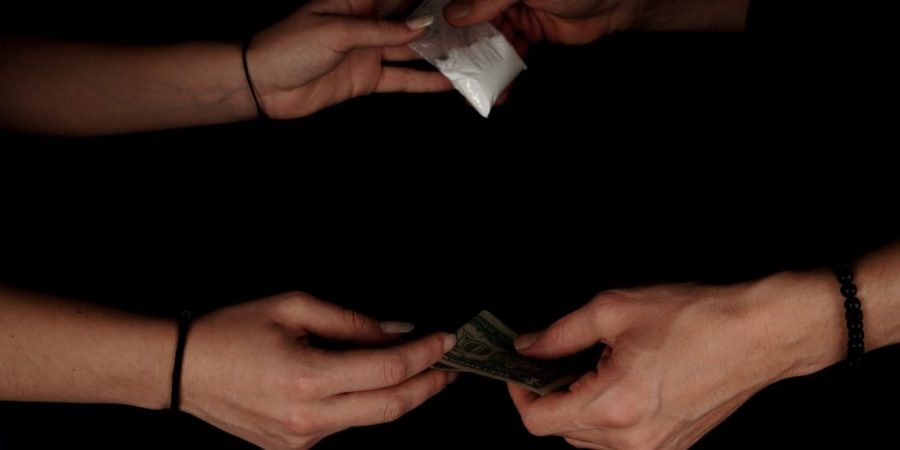
Cocaine addiction can consume a person’s life, making it difficult to convince them to seek help. If you believe someone you know is living with a cocaine habit, it’s important to watch out for signs of cocaine addiction.
It’s normal to feel scared or concerned when someone you love displays signs of cocaine addiction, or even if you start to notice these symptoms in yourself. But there is always a path forward toward recovery. Keep reading to find out what signs of cocaine addiction to watch for and what you can do if they appear.
Table of Contents
What to Know About Cocaine

Cocaine, or crack cocaine, is made from the leaves of the South American coca plant. It is a highly addictive stimulant classified as a Schedule II drug that people either snort or inject to feel lively and energetic. Even though it originates from South America, cocaine is one of the most popular drugs in the United States.
Cocaine, commonly referred to as coke or blow on the street, is one of the most addictive drugs in the world. Cocaine can come in powder or rock form and affects your central nervous system, increasing energy levels to keep you awake while raising your heart rate and blood pressure. The drug also makes you feel good by flooding the brain with certain neurotransmitters that increase feelings of pleasure.
Cocaine stops the reuptake of certain monoamine neurotransmitters such as dopamine, serotonin, and norepinephrine. Reuptake is the process of removing these neurotransmitters from your synaptic gap. When reuptake doesn’t occur, it causes an excess level of neurotransmitters in the synaptic cleft. This higher concentration of monoamine neurotransmitters in the brain causes post-synaptic neurons to be higher than usual, giving the user a boost of energy and a false sense of confidence. These and other effects can cause you or someone you love to develop an addiction.
If you’re worried you or a loved one might have a problem, knowing the signs of cocaine addiction can help you make an informed decision about seeking treatment.
Behavioral Signs of Cocaine Addiction
In 2020, a National Survey on Drug Use and Health found that nearly 1.5 million individuals aged 12 or older admitted to having a cocaine use problem. People exhibiting signs of cocaine addiction don’t act like their normal, sober selves. While a lot of cocaine can intensify your high, it can also lead to violent, unpredictable, and strange behavior.
When a person is using cocaine, they might also feel:
- Upbeat and energetic
- Talkative
- Sensitivity to touch, light, or sound
- Euphoric
- Anxious
- Restless
- Nervous
- Agitated
- Paranoid
A severe cocaine addiction can worsen any underlying co-occurring mental health disorders a person might have. In addition, the more cocaine a person uses, the more likely they are to develop physical challenges and other signs of cocaine addiction.
Physical Signs of Cocaine Addiction
Trying to figure out if your loved one is showing symptoms of cocaine addiction? Some physical clues might be able to give you an answer.
Physical signs of cocaine abuse include:
- White powder around the nostrils
- Dilated pupils
- Red or bloodshot eyes
- Nosebleeds
- Runny nose
- Excessive sweating
- Weight loss
Since the physical signs of cocaine addiction are easy to spot, you might look at those first. If the person you are concerned about exhibits one or more of the above-listed physical signs combined with any behavioral ones, they might benefit from a treatment facility.
How to Overcome Cocaine Addiction

Abusing cocaine can seriously affect a person’s mental and physical health. However, the Woods at Parkside staff know the signs of cocaine addiction and have several different treatment options, so you or your loved one can safely overcome your addiction to cocaine.
Cocaine Detox
The detox program at The Woods at Parkside assists patients battling cocaine addiction. Because detoxing from cocaine can be dangerous, our detox program is overseen by experienced doctors and 24-hour nursing care. Our knowledgeable staff can help you overcome the nasty side effects of cocaine abuse withdrawal, including depression, intense cravings, anxiety and irritability. The severity of withdrawal symptoms varies from person to person and can be influenced by age, overall health, and the length of time using the drug.
Other signs of cocaine addiction withdrawal symptoms include:
- Poor concentration
- Nausea and vomiting
- Exhaustion
- Increased appetite
- Paranoia
- Chills
- Body aches
- Tremors
Cocaine withdrawal symptoms can be so intense that people often return to using the drug to alleviate their pain and discomfort. This stage can last up to 10 days, depending on the length of time you used the drug and the amount used. This makes detoxing at a rehabilitation center the safest and most secure way to quit.
Residential Treatment for Dual Diagnosis
The staff at The Woods at Parkside are familiar with all the signs of cocaine addiction and know how to treat those with a cocaine problem. While everyone’s recovery journey looks different, individuals with co-occurring disorders receive specialized treatment from our experienced staff. If the physicians at The Woods at Parkside determine an underlying mental illness, they will work with you to simultaneously treat your addiction and psychological disorder.
Examples of co-occurring mental illnesses include:
- Depression
- Anxiety
- Post-Traumatic Stress Disorder
- Bipolar Disorder
- Schizophrenia
Having a mental health disorder increases your chance of relapse because the temptation to self-medicate often overpowers your desire to stay sober. That’s why it’s important to treat both addiction and mental illness together. The Woods at Parkside’s 45-day (maximum) treatment program includes one-on-one therapy, group counseling, relapse prevention, stress management, art therapy, family education, recreational therapy, music therapy, life skills groups and group fitness to help you overcome your addiction.
When to Seek Help for Cocaine Addiction
When you know the signs of cocaine drug abuse, you can encourage your loved one to understand the risks of drug addiction and seek treatment. Or if you personally abused cocaine in the past year, you might consider getting help for yourself. Within our structured, healing environment, we can ease clients into the significant lifestyle changes required for recovery. To learn more about how to spot signs of cocaine addiction, contact us online or call our admissions specialists at 419-452-4818.
The post Signs of Cocaine Addiction: What to Look for appeared first on The Woods At Parkside.
Source
Original Author: The Woods at Parkside

